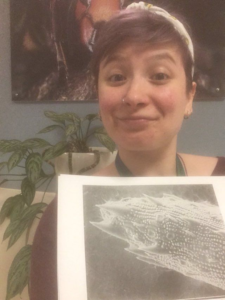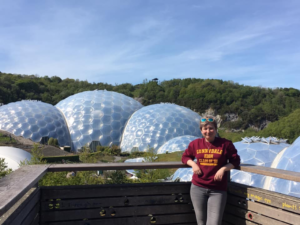This year, Naomi completed her PhD at the University of Sheffield. Her project focused on rice leaf development, looking in to when the leaf pattern is set, and how the final mature leaf develops from undifferentiated cells. After being awarded her PhD in August, Naomi is now working as a trainee clinical bioinformatician at Sheffield Children’s NHS Foundation Trust.

When did you begin writing up your thesis? What were the challenges you faced in writing?
Outside of writing up my methods as I went (would strongly recommend this!), I started writing properly last summer (2019) when I was on my placement in the Philippines. I wound up with a lot of time alone on evenings and weekends, and no Netflix to entertain me, so writing was a good distraction. This meant by the time I came home I’d drafted my introduction, the better part of two data chapters and written a News and Views commentary article for Plant Physiology with one of my supervisors. While I can’t say I recommend being alone in a new country as a writing technique, when it came to finishing the thesis this summer I was very grateful to have a chunk drafted already – future you will be thankful for anything you’ve done in advance!
My biggest challenge was trying to combat imposter syndrome while writing up. For a long time, I didn’t feel like my work was a significant contribution to the field. Unfortunately I don’t have any advice to combat this, but I certainly felt much happier about the work after my viva!
How did you find doing a viva virtually?
I wasn’t entirely sure what to expect, although in hindsight, I should have seen the technical difficulties coming. While an online viva wasn’t exactly the end for my PhD that I’d been imagining, I actually did enjoy it, it was really great to have a conversation with experts in the field about my work. It also helped that my lab organised an (outdoor, socially distant) celebration straight afterwards, so I still got to mark the occasion properly!
What are your personal and academic highlights from your time as a PhD student?
My lab really made my PhD – I’ve worked with so many people who are not only brilliant scientists, but also incredibly kind and supportive people and excellent bakers. A particular academic highlight was the PEPG Early Career conference three of us attended at the Eden Project, where we got a behind-the-scenes tour of the biomes!

What are you up to now that you’ve graduated?
I’m currently training to be a clinical bioinformatician as part of the NHS Scientist Training Program (STP), on the genomics stream. Clinical bioinformaticians do a variety of things, including maintaining and improving diagnostic sequencing pipelines, and developing applications to help other healthcare scientists, all with the aim of improving the service for patients. We’re basically right at the intersection of clinical science and technology, so it’s a really exciting area to be working in right now.
When did you start looking for a job? What swayed you away from academia?
I wouldn’t say I swayed away from academia – staying was never the plan for me. I enjoyed my PhD, but I’ve known from very early on in the process that I would prefer to work in an environment where I could make a more direct impact. I was very lucky that my supervisors were supportive of this – that is not always the case. As 70% of PhD graduates have left academia within 3 years of finishing (https://www.hepi.ac.uk/2020/07/16/new-report-shows-67-of-phd-students-want-a-career-in-academic-research-but-only-30-stay-in-academia-three-years-on/), I really hope that soon the narrative of “academic vs alternative careers” changes to just… careers.
Applications for the STP open early – I started working on my application last December, and found out I’d got my place in early June. It took a lot of forward planning though – I had to organise my work really carefully to make sure I could submit early, a plan which was only minorly disrupted by COVID.
What advice would you give to current 4th year students who are beginning to write their thesis?
Storyboarding your data can be a great starting point for beginning a chapter. Don’t be afraid of sending drafts to your supervisors and receiving feedback full of track changes. That doesn’t necessarily mean your work is bad, just that they’ve got years more experience of academic writing than you, and want to help you produce the best possible thesis. Also, cite as you go, so you don’t have to spend hours working out what you meant when you typed <<CITATION>> after a sentence (this one might just be me…). Finally, when you’re close to submitting, give yourself time (as in at least a day) to format! (Word may have renumbered all of my figure legends when I converted to PDF on the day of submission…)
